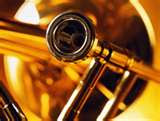
I would first like to skim over what I have learned during the past few years in the ensemble, as well as construct a sort of time line for how I became exposed to different aspects of the band.
My first experience with the band was the fall of 2007, when Casey Thomas (the group's director) invited me to see one of their regular Subscription concerts in Mount Vernon. I was hesitant to come, because I didn't know what to expect, and thought it was going to be the equivalent of an ameteur community band concert. MAN was I wrong! The ensemble was very talented, played great repertoire, and had a great sense of humor. One piece in particular that was played that night was a Frank Sinatra romantic song... or something (I can't remember right now, sorry) that was sung by one of the members, while one of the cornet players-- a man, I might add-- came out from back stage dressed as an old woman with a walker! That was one of the first lessons I learned that night about brass bands, at least the ones in the US. Entertainment value is ALWAYS imcorporated into concerts and competitions!
I believe it was in the Spring of 2008 when I was asked to sub for one of the members for a rehearsal. I was very nervous, because I really didn't know anyone, and they were doing a clinic with a director of a Chicago brass band in preparation for their US Open Brass Band Championships coming up. www.usopenbrass.org
I did fairly well, and was slowly learning what tenor horns were, and the fact that baritones and euphoniums are 2 different instruments, rather than the same, like they tend to become in a symphony band. I learned that trombones were the only cylindrical instruments in the whole ensemble, due to the fact that they use cornets instead of trumpets, and tenor horns instead of F. horns and such. Tubas are actually called "basses" and are pitched in either E flat or B flat. Soprano cornets are used as the highest voices of the ensemble, and often take much of what the cornets have and play it an octave above. More research is to come of the role of soprano cornet, as well as the rest of the instruments.
To be continued in Part II...

No comments:
Post a Comment